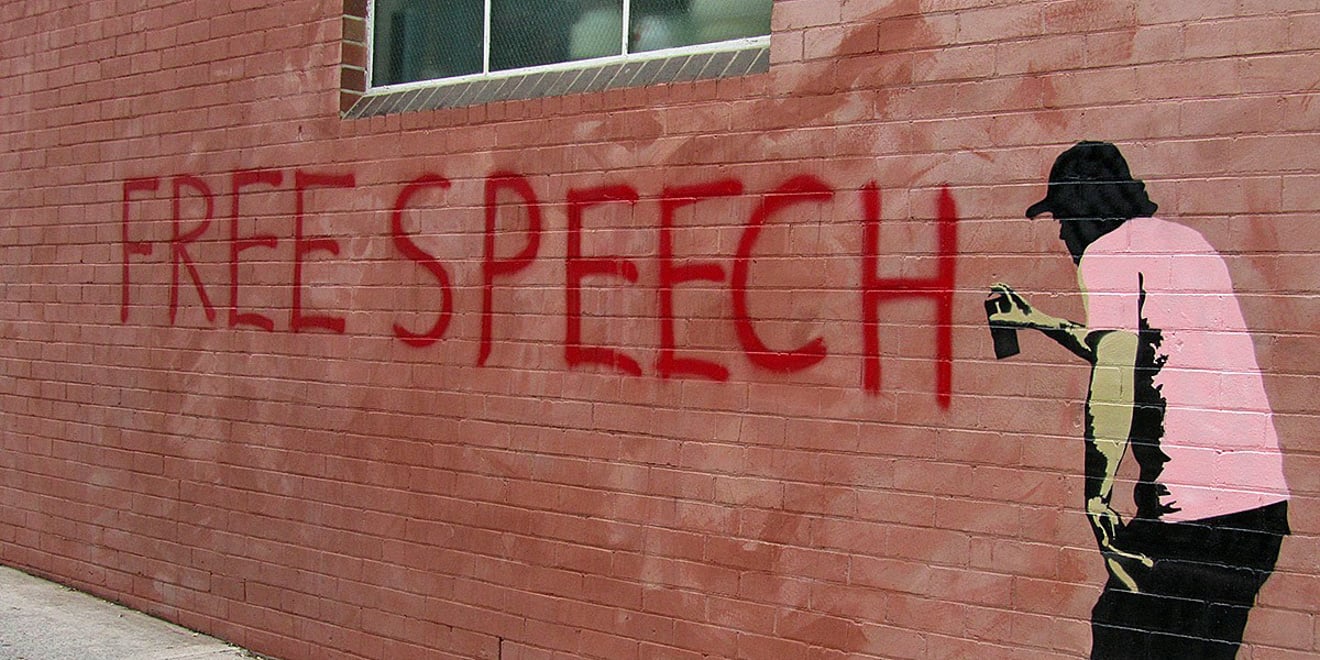
Clickbait Philosophy is a new weekly Reads beat column published in the Wednesday issue of The Daily. Each week, we will tackle a new philosophical issue that has an impact on undergraduate life. We hope to provide philosophical perspectives not usually found within the pages of this paper.
Over the past few years, the topic of what should and should not be said on a university campus has taken on a very public character. Free speech, according to some, is the pinnacle of academic integrity. Anything can and should be up for discussion, or we risk falling into a form of vicious dogmatism. On the other hand, there are those who argue that there are some topics that are of such a nature that the very act of debating them constitutes an implicit endorsement. On this line of thought, we ought, for instance, to deny a platform for debating the tenants of fascism. To do so is to legitimize and enable evil.
For those involved, the stakes of this debate are incredibly high. This probably has something to do with the sense of urgency that it engenders. This is likely to inspire extreme opinions on both sides. However, it seems to me that a middle path with regard to free speech is correct. There are few things that we can feel comfortable saying are unqualified goods (i.e. that we ought to pursue them whatever the consequences). Nonetheless, we will equally be misled if we think that utilitarian calculations about silencing views we think are incorrect straightforwardly justify censorship. Indeed, that whole approach to the debate is deeply misguided. A truly complete account of the role freedom of speech in a modern society will be able to capture both its defeasibility and its centrality to our political thought and commitments. This will be a nuanced and piecemeal project. Each of the works outlined below is one step, I believe, towards its completion.
John Stuart Mill, “On Liberty”
“On Liberty” is essential background reading for anyone interested in the free speech debate. It has been of enormous intellectual significance since its publication and has had probably the most policy impact of any book on this list. The gist of the thesis, however, is relatively simple. Human beings are highly fallible creatures. As such, we tend to have levels of confidence in our beliefs that are out of proportion with the evidence for such beliefs. For instance, when we have social support for a proposition, we tend to view its truth with more certainty than we should. Likewise, when we are plagued with self-doubt, we have trouble mustering any confidence — e.g. the adolescent who believes himself to be unlikable will not be able to adequately appreciate the counter-evidence that he in fact has an average number of friends. Mill argues that the best way to mitigate this fallibility is to encourage a diversity of viewpoints, which a society can then collectively evaluate. Mill’s preferred method of evaluation is democratic, and this work has long been seen as a cornerstone of classical liberalism. However, to those who find themselves outside this camp, Mill poses a fundamental challenge: Find a better solution to human fallibility.
Helen Longino, “The Fate of Knowledge”
Helen Longino is a distinguished philosopher of science and biology and a longtime member of the Stanford faculty. In this important book, she discusses the idea of knowledge, particularly as derived from science, in a social context. She proposes that the institution of science is fundamentally biased in numerous ways. While this bias is not wholly correctable, Longino argues that the most intellectually responsible reaction is to encourage a far-reaching pluralism, both within scientific research itself and with regard to scientific researchers. The best form of science will be the one that has the highest viewpoint diversity, as exemplified by some case studies from the history of science. In some ways, this is a broadly Millian line (as Longino acknowledges); however, the detailed application to the topic of science makes it clear that freedom of speech is not just a political issue. Furthermore, Stanford’s mission qua university is to pursue new knowledge. It is important to recognize the extent to which viewpoint pluralism is necessary for this to be possible.
Plato, “The Republic”
As one of the foremost theorists of all time, Plato generally needs no introduction. In this, perhaps his most seminal work, he offers a philosophical account of just about everything. For those interested in free speech, however, the sections in Books II, III and X on poetry deserve special attention. Here Plato argues that the perfect state will have to make pragmatic concession to with regard to freedom of speech, since many forms of speech have an exceptional power to corrupt. This thesis has lead to many modern political theorists expressing considerable uncomfortableness with the work. Nonetheless, Plato’s position is exceptionally well argued. He shows us the logical ends to which some of our intuitive commitments may lead. We might well decide that moral necessity justifies authoritarianism. But to the extent that we want to reject this option, potentially even for Millian reasons, we need to impose not just practical but theoretical boundaries on moralizing.
Jason Stanley, “How Propaganda Works”
This book is not about free speech per se but rather about the power of language in society, both contemporary and historical. Jason Stanley is an exceptionally intelligent philosopher and a clear writer. Here he reminds us just how important public discourse can be by directing our attention not just to the power of semantic content but also to the rhetorical power of the way we choose to express that content. The idea that there are power dynamics behind all social activities is not new, but this work offers a particularly reasonable account of it. It is an essential part of any position on free speech that it be able to treat public discourse as not just as an ideal but also as a phenomenon situated in history and practice. This book starts us down that path.
Bernard Williams, “Truth and Truthfulness”
Written by the most important moral philosopher of the last half-century, this book deals with the relevance of the concept of truth and the propensity to tell the truth for human societies. Williams is especially concerned with answering the challenge of many postmodernists and pragmatists, who claim that truth is a sham concept and that power is really what is at play in social discourse. To my view, Williams is successful insofar as he shows just how important the notion of truth is to societies that wish to honor things like human dignity and rights, and that therefore truthfulness must be amongst the highest virtues of those societies. This reminds us that we need not be just concerned with the political ramifications of beliefs but also whether or not those beliefs are actually correct. Discourse about free speech cannot just be a discussion about power and marginalization. This may come at a tremendous emotional cost, but it is necessary. To quote Williams, himself partially quoting Nietzsche, “they are brave animals, ‘who have been taught to sacrifice desirability to truth, every truth, even a plain, bitter, ugly, foul, unchristian, immoral truth … because there are such truths.‘”
Contact Cam Hubbard at camh502 ‘at’ stanford.edu.
